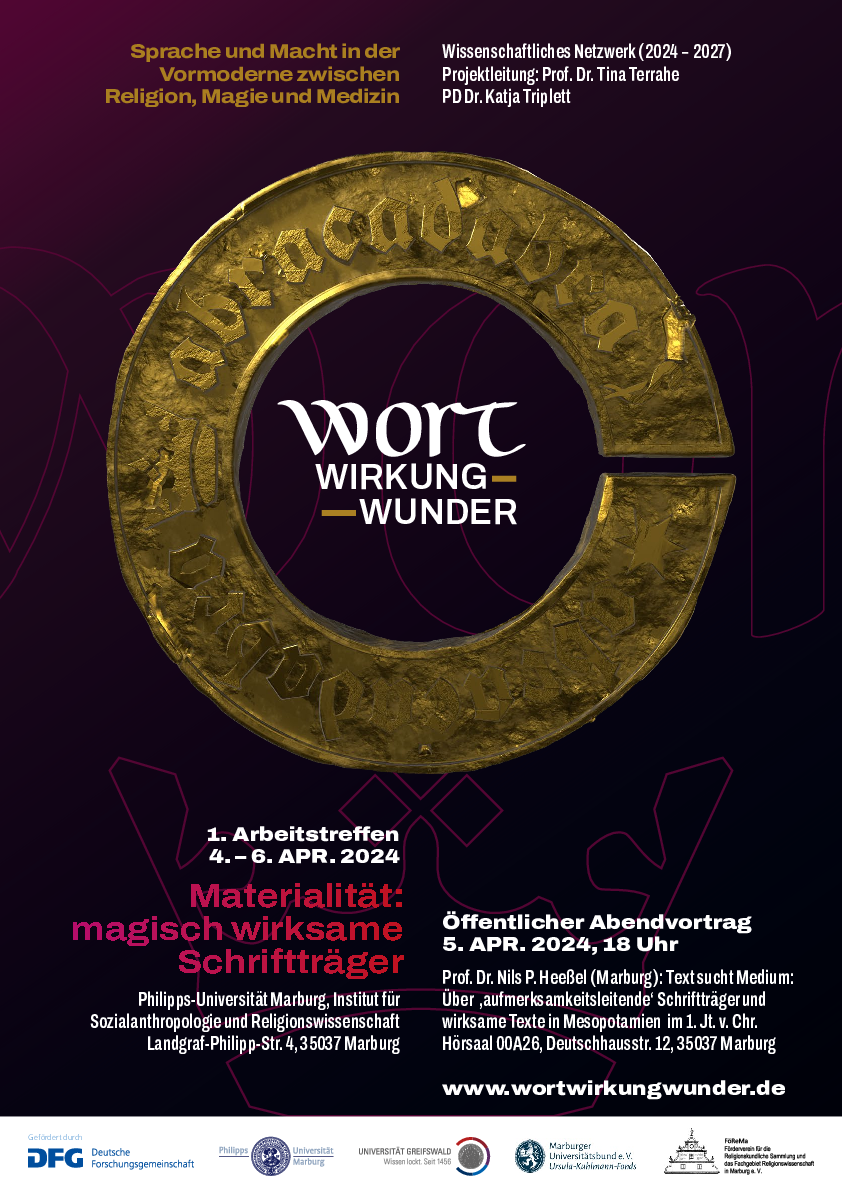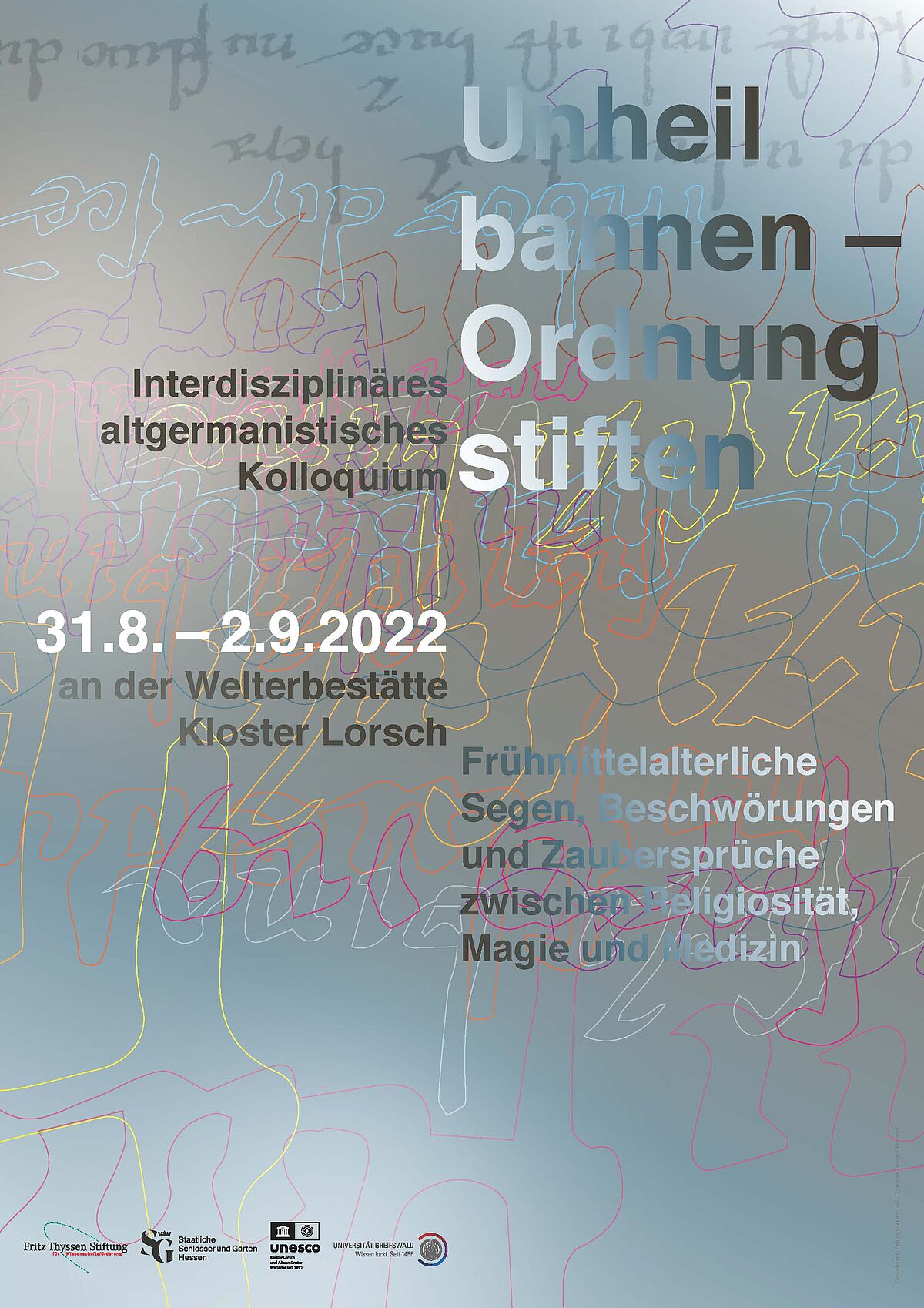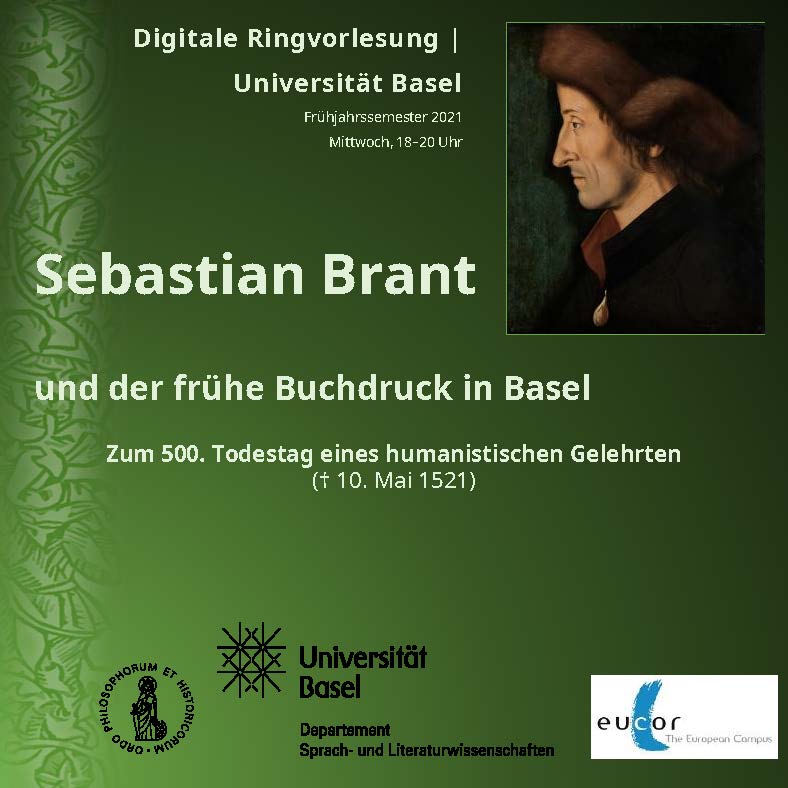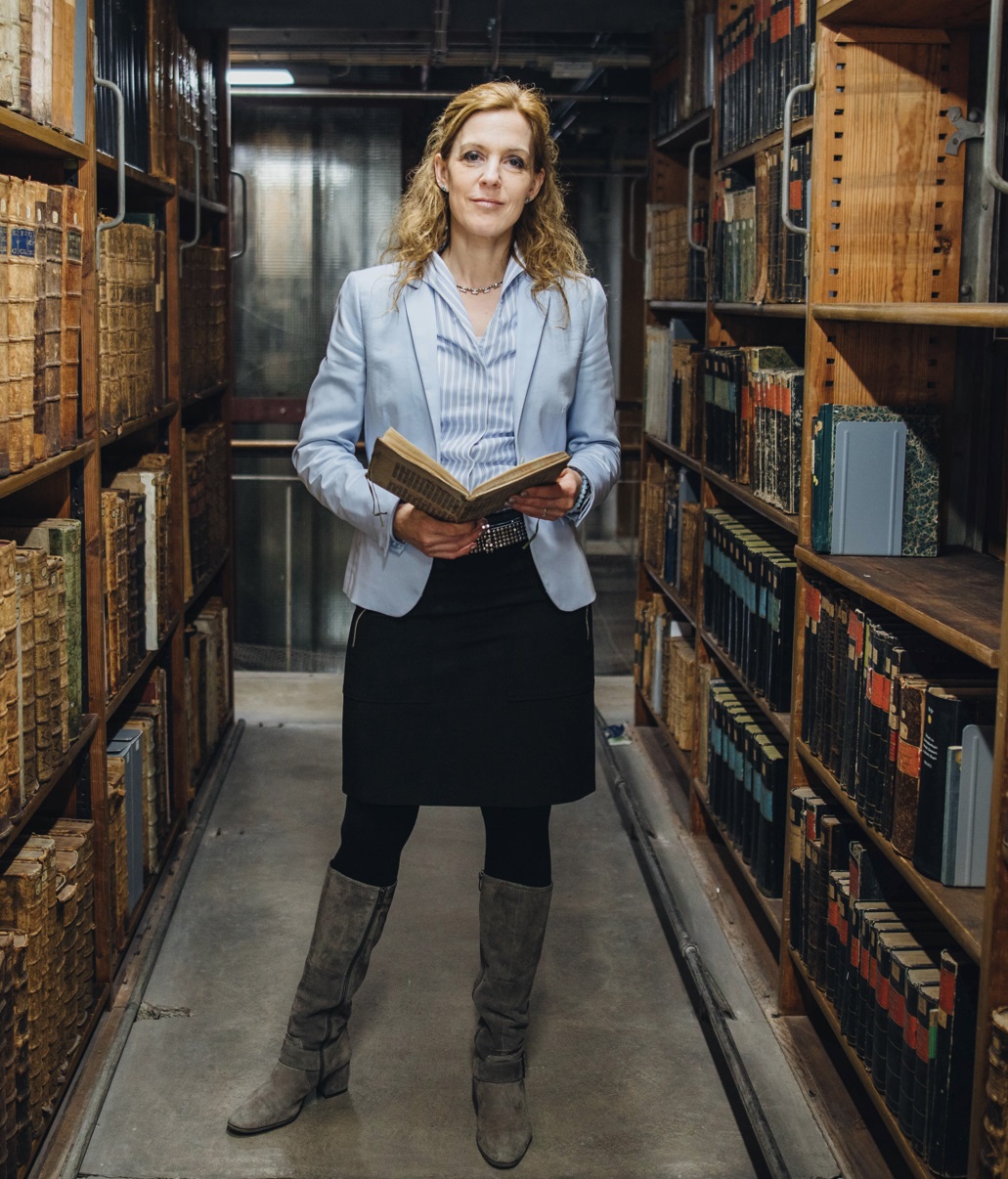
Older German Language and Literature
Department of German Philology
Rubenowstraße 3 - Room 3.11
17487 Greifswald
Tel.: +49 3834 420 3438
terrahetuni-greifswaldde
Consultation hours
Tuesdays, 11:00 a.m.-12:00 p.m. in presence and digital
Registration in the digital office until Monday, 4:00 p.m.
- and by appointment by email
| since 06/2024 | Dean of Studies of the Faculty of Arts and Humanities |
| 04/2024-06/2024 | Managing Director of the Department of German Philology at the Faculty of Arts and Humanities |
| since 08/2022 | University professor, Chair holder of Older German Language and Literature at the University of Greifswald |
| 2021–07/2022 | Interim professorship for "German Medieval Studies" at the University of Basel |
| 2020–2021 | Senior Scientist ‘Older German Literature’ at the Department of German Studies at Paris Lodron University Salzburg |
| 2019 | Habilitation at the Philipps University of Marburg, Department 09 German and Art Studies; venia legendi for ‘German Medieval Studies’, award of the title ‘Privatdozentin’ (private lecturer) |
| 2005–2020 | Research assistant at the Department 09 German and Art Studies, Institute for Medieval German Philology at the Philipps University of Marburg (Chair Prof. Dr. Christa Bertelsmeier-Kierst) |
| 2011 | Doctorate (summa cum laude) in Older German Literature from the Department of German and Art Studies at the Philipps University of Marburg. |
| 2007–2012 | Collaboration on the DFG project ‘’Marburger Repertorium zur Übersetzungsliteratur im deutschen Frühhumanismus‘’ (MRFH) led by Prof. Dr. Christa Bertelsmeier-Kierst |
| 1999–2005 | Studies of German Language and Literature as well as Medieval and Modern History at the Philipps University of Marburg: First state examination for the teaching profession at grammar schools in the subjects German and History |
| 1997–1999 | Classical training at the Frankfurt Music Academy in the subjects violin & piano |
| 1997 | General higher education entrance qualification; Gutenbergschule (grammar school), Wiesbaden |
| 1992–1994 | Music Academy Wiesbaden, subjects: violin & piano |
| *1976 | three daughters (*2006, *2008, *2015) |
Key fields of research:
- Digital Humanities; (digital) edition philology
- Palaeography and codicology - materiality & mediality
- Early medieval poetry (blessings, incantations, spells)
- Courtly poetry and epic poetry around 1200
- Literature of the early modern period (prose novels, literature of knowledge and utility, chronicles, travelogues)
- Historical narratology; cultural and social history
Co-operations:
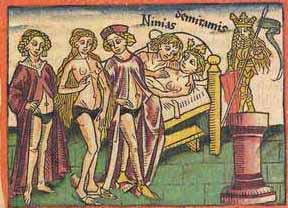
Marburger Repertorium zur Übersetzungsliteratur im deutschen Frühhumanismus (MRFH)
Digital Humanities-Project (DFG)
Prof. Dr. Tina Terrahe has been working on an updated version of the MRFH as project manager in cooperation with the Philipps University of Marburg since 2023. Despite the changed layout, all content and functions remain the same.
Project leader until 2022: Prof. Dr. Christa Bertelsmeier-Kierst (Marburg).
The project Übersetzungsliteratur im deutschen Frühhumanismus (MRFH), funded by the DFG from 2007 to 2012, is part of the Marburg Repertories and is thus part of a long research tradition of preserving the heritage of the humanities and linking it with information technology procedures in accordance with current processes of change (‘Digital Humanities’).
The MRFH presents the early humanist translators and their German-language works up to 1500, covering not only the translators of the first generation, but also authors of the transitional period, whose sphere of activity was primarily at the university, the Heidelberg court and the metropolises of Strasbourg, Basel, Augsburg and Nuremberg.
A total of 144 works from the period 1450-1500 have been catalogued, but no city chronicles have been included; these are to be dealt with separately in a later project.
The MRFH devotes considerable space to the history of the transmission of translations, which also reflects the transition from manuscripts to printed books. Early humanist authors in particular paid special attention to the new medium of ‘print’; in some cases they themselves worked as printers or publishers in order to make humanist writings accessible to a wider public.
A total of 122 manuscripts and 145 incunabula (with around 2500 copies) were analysed and described in detail at the MRFH. The later printed tradition up to 1600 was only recorded in short entries (without copy references). 273 prints from the 16th century were identified, primarily on the basis of VD 16, Index Aureliensis and more recent dissertations. Digital copies of manuscripts and prints from the 15th and 16th centuries have been included and are continuously updated. At the same time, the dedication addressees named in the translations as well as the contemporary owners of the manuscripts and incunabula and - as far as they could be identified - the scribes of the manuscripts are recorded in detail. Of the approximately 300 persons identified, 42 scribes (including 6 autographs of translators), 32 addressees and 160 owners were identified and presented in short biographies. In addition, the dedications were reproduced in the exact wording of the manuscripts and prints.
To the MRFH homepage/database [de]
Wort – Wirkung – Wunder. Sprache und Macht in der Vormoderne zwischen Religion, Magie und Medizin
Wissenschaftliches Netzwerk (DFG) 2024–2027

Project management:
Prof. Dr, Tina Terrahe (Greifswald: German Medieval Studies) terrahetuni-greifswaldde (applicant)
PD Dr. Katja Triplett (Marburg/Leipzig: Religious Studies / Japanese Studies) katja.triplettuni-leipzigde (co-responsible)
Click here [de] to go to the homepage.
Principles of word magic - from the earliest evidence to the early modern period
The word, whether written or spoken, is ascribed a great deal of power in religious, magical and medical traditions: People try to heal and cast spells with words, gods are worshipped with language and power is exercised with writing. Many cultural systems claim to use words and characters to change reality and intervene in the context of the world.
The interdisciplinary academic network examines the cultural paradigms underlying the word-magical ideas of pre-modern societies with regard to the power of language and writing at the interfaces of religion, medicine and magic. The aim is to investigate how the supernatural effect of words, language and writing comes about according to the sources and which principles of action can be identified as universal or unique.
The field of investigation extends from the earliest evidence to the early modern period, whereby the connection to current discourses and modern problems is seen as a central task. This is because some principles of word magic have been practised in identical ways for thousands of years and have not lost their power of fascination to this day, as can be seen from their current reception in art and culture. The ambitions to make use of supernatural forces, power or wisdom and to achieve miracles may be based on anthropological constants, the identification of which would be an objective of the analyses, such as the question of the future, the safeguarding of health and material goods as well as the longing for love and the fear of death.
Interdisciplinary work on written artefacts
Based on a medieval focus in the field of ancient German studies, the network aims to integrate numerous historical subjects from related disciplines. The planned research discourse feeds on an intensive exchange with historical and religious studies, ancient oriental studies, Egyptology, Islamic studies, Jewish studies and Christian liturgical studies as well as classical philology (Greek/Latin studies) and the history of medicine in order to achieve synergy effects and create new theoretical approaches. Methodologically, we strive for material-based research, whereby in addition to texts, written artefacts and other early sources are also targeted as research material.
The interdisciplinary dialogue is intended to shed light on common questions from different perspectives and provide impetus for the further development of scientific methods and the networking of small subjects. With the help of this broadly based approach in terms of subject and time, overall anthropological constants can be determined: What difficulties did people try to solve early on with the help of words, language and writing? How do we imagine the desired effect? Where are the similarities and differences in word-magical potency in various religious, magical and medical traditions?
The analyses developed under this focus are also intended to reflect, with regard to modern discourses, questions that have interested mankind since the beginning - since man began to distinguish himself from other living beings through language and its written notation and to want to exercise power over them.
Work formats and securing results
Over a three-year period, six thematically structured working meetings are planned, at which (open access) publications of jointly discussed individual studies will be prepared, the systematic coherence of which is guaranteed by the comparative work phases. In addition to the 20 permanent members, guests are invited to enrich the working programme of the network, which also sees itself as an instrument for promoting young researchers. An initial planning meeting took place online on 4 and 7 March 2022.
Berufsrisiko Tod: Narrative Konzepte des (Über- und) Ablebens in der höfischen Epik um 1200. Marburg 2019.
Habilitation thesis
The study examines the deaths owed to the medieval heroic ethos and their function in the narrative structure of the texts: Using the central courtly epics from around 1200, the study examines genre-specific heroic concepts and their relationship to death. The ‘Song of Roland’ by the priest Konrad, for example, stages the holy death of the Christian crusaders, whereas Heinrich von Veldeke's ‘Eneasroman’ emphasises the qualities of a good general who spares the lives of his subjects. Hartmann's Arthurian romances ‘Erec’ and ‘Iwein’ discuss peaceful strategies of conflict resolution in order to avoid deadly duels, and in Wolfram's ‘Parzival’ knights die in rows in the too late rewarded minstrel service.
In addition to prominent literary deaths, supposedly unimportant minor figures, who have not received much attention in previous research but have rather been overlooked, are systematically analysed here for the first time. The project is dedicated to them and aims to show that, in addition to the survivors, the countless poetic deaths, both prominent and non-prominent, are essential for the conception and impact of the texts. The dead must always be seen in relation to the survivors, who are therefore responsible for the deaths because they either did not prevent them or risked them recklessly. The study, which is oriented towards cultural studies, thus deals with historical-narratological and philological questions concerning the areas of interference between history, law, cultural studies and German studies.
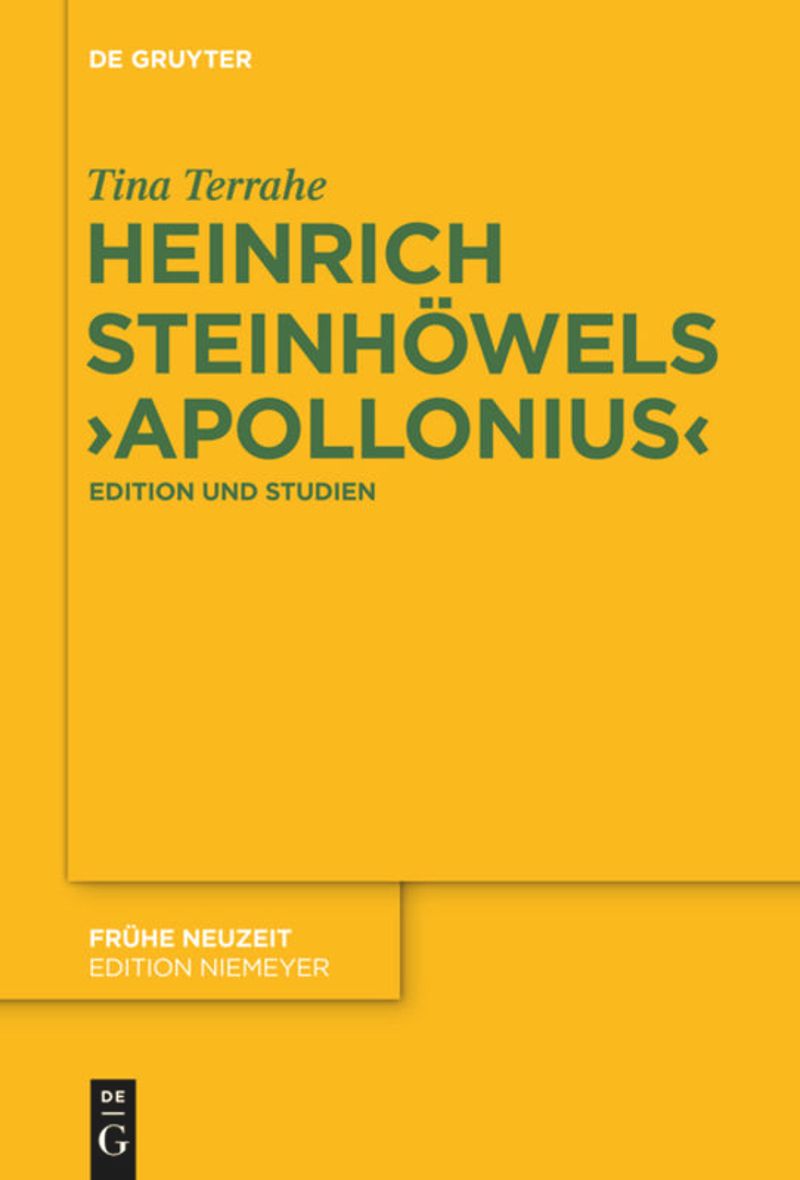
Heinrich Steinhöwels >Apollonius<. Edition und Studien. (Frühe Neuzeit 179) Berlin 2013.
Dissertation thesis
The story of Apollonius of Tyre is considered a favourite book of the German Middle Ages. The previously unedited adaptation of Apollonius by the early humanist Heinrich Steinhöwel from Ulm is presented in a critical Latin-German parallel edition together with studies on the tradition and genesis of the text. The particular proximity of the leading manuscript to the author's personal environment, which also represents the oldest language status, makes the textual witness the starting point for an edition that documents the revision for the supra-regional book market in the apparatus with the deviations from the version by the prominent Augsburg printer Günther Zainer (1471). In this way, profound conclusions can be drawn about literary production and business on the threshold from manuscript to book printing.
The research section situates the author and work in a socio-historical context, for which a considerable number of sources are available. The close personal network between translator, scribe and manuscript and incunabula owners reveals a specific public interest in a text that can be attributed a political virulence in the sense of the contemporary crusade ambitions after the fall of Constantinople (1453).
In this respect, a circle is closed between the Ulm author, the Augsburg revision for book printing, a supra-regional public interest and the owners of the textual witnesses, and opens up a wide-ranging perspective on the political and cultural-historical context of vernacular literature in times of media upheaval.
Humanistische Antikenübersetzung und frühneuzeitliche Poetik (1450-1620)
Wissenschaftliches Netzwerk (DFG)
The DFG-Netzwerk (2011-2016) investigated German translations of ancient texts that were produced in the 15th and 16th centuries and were important for the differentiation of the German literary language.
Project description:
In the early modern period, under the influence of the humanist educational movement, there was a fundamental change in the relationship to ancient literature compared to the medieval reception of antiquity: Some of the writings of classical authors were rediscovered, edited and annotated; from around 1450, numerous translations were produced in the German-speaking world. The intensive examination of the content and style of the ancient works resulted in a variety of changes in literature and in the self-image of the authors and translators in the vernacular. In this way, the new approach to early modern poetics by Martin Opitz and his successors, which was programmatically linked to antiquity, was prepared in some respects, but - unlike the French and Dutch models - not honoured by them. The network would like to examine the linguistic, narratological and genre-specific accentuations of the vernacular translations of the 15th and 16th centuries, whose literary-historical significance has been underestimated in research to date, and in particular to work out the connection between the translations of antiquity and early modern poetics. The aim is to determine the contribution of translations to the differentiation of the German literary language and literature in the early modern period. The results will be published in an anthology.
Publication: Humanistische Antikenübersetzung und frühneuzeitliche Poetik in Deutschland (1450–1620). Edited by Regina Toepfer, Klaus Kipf and Jörg Robert. Berlin, Boston 2017 (Frühe Neuzeit 211).
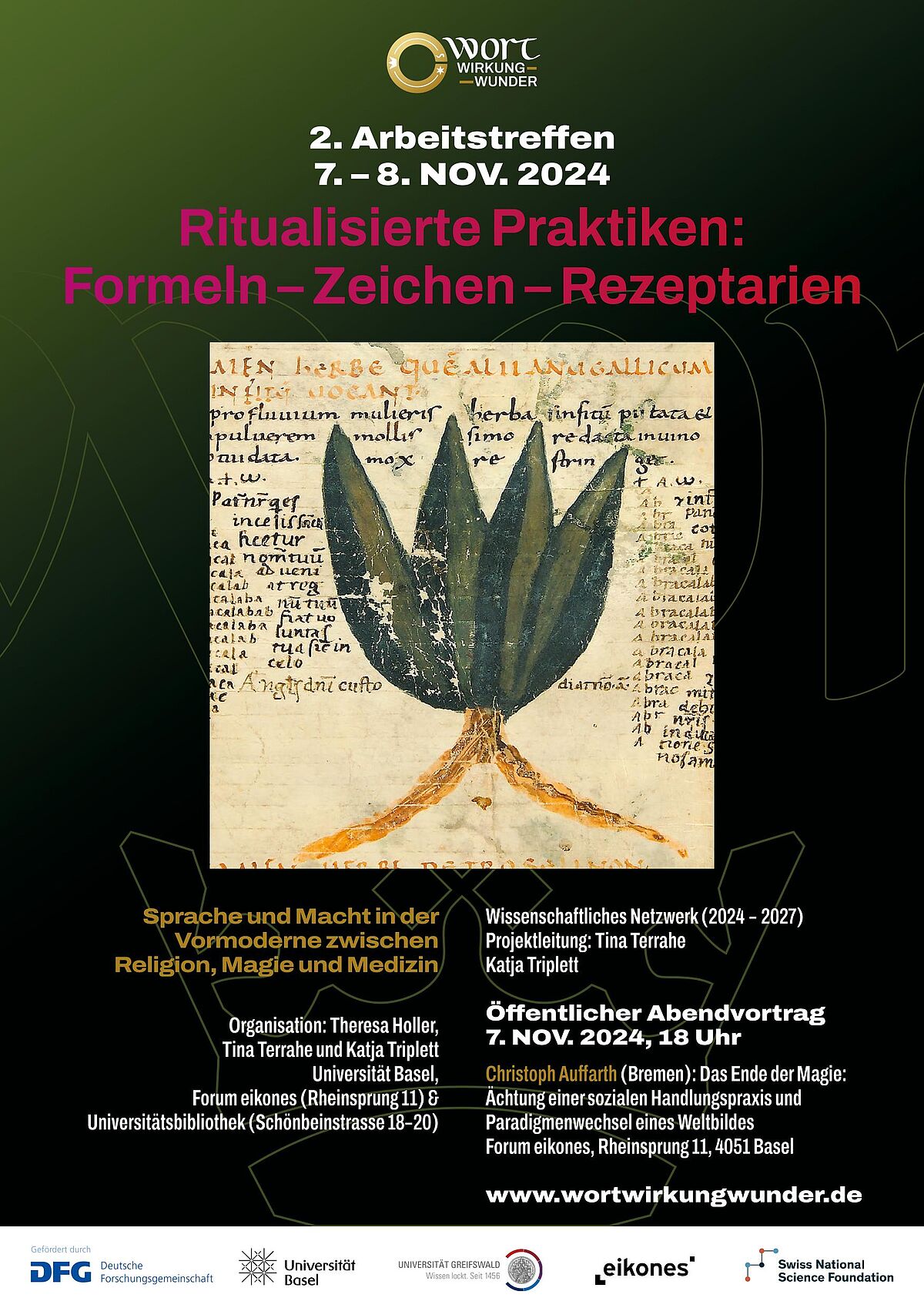
Ritualisierte Praktiken: Formeln – Zeichen – Rezeptarien
Second work meeting of the network " Wort - Wirkung - Wunder. Sprache und Macht in der Vormoderne zwischen Religion, Magie und Medizin."
2nd work meeting: 7-8 November 2024 University of Basel [de]
Workshop as part of the academic network ‘’Wort - Wirkung - Wunder. Sprache und Macht in der Vormoderne zwischen Religion, Magie und Medizin"
Project management: Prof. Dr. Tina Terrahe & PD Dr. Katja Triplett & Theresa Holler
Materialität: magisch wirksame Schriftträger
First work meeting of the network ‘’Wort - Wirkung - Wunder. Sprache und Macht in der Vormoderne zwischen Religion, Magie und Medizin."
Workshop as part of the academic network ‘’Wort - Wirkung - Wunder. Sprache und Macht in der Vormoderne zwischen Religion, Magie und Medizin"
Project management: Prof. Dr. Tina Terrahe & PD Dr. Katja Triplett
You can find the programme here [de].
Unheil bannen - Ordnung stiften. Frühmittelalterliche Segen, Beschwörungen und Zaubersprüche zwischen Religiosität, Magie und Medizin
Interdisciplinary colloquium on ancient German studies: 31 August to 2 September 2022 at the Lorsch Abbey World Heritage Site
Early medieval blessings, incantations and spells are among the oldest written testimonies in the vernacular, and they were created against a practical apotropaic horizon of interest: they were intended to heal the sick, protect valuables and avert danger. Due to their narrative elements, these texts are miniature epics that also integrate performative aspects and instructions for action. Using medical, religious or even (pseudo-)magical means, this literature attempts to restore an order that has fallen apart at the seams. From a cultural-historical perspective, the hybridity of these texts is significant, as they oscillate between religion, magic and medicine from a modern perspective, but pursue identical motifs. From a codicological point of view, they are remarkable because the early manuscripts do not provide a specific place for the sayings, which is why they were initially entered more or less randomly in the margins of other texts or on leaves that were originally left blank.
The ‘Lorsch Bee Blessing’, which was inscribed in the 10th century at the bottom of the page of a Carolingian manuscript, occupies a special place among these texts. Alongside the ‘Lorsch Confession’ and hundreds of Old High German glosses in the famous ‘Lorsch Virgil’ alone, the ‘Lorsch Bee Blessing’ is one of the better-known examples of vernacular reminiscences in otherwise entirely Latin manuscripts from Lorsch.
The poor state of research is rooted in the paradigms of the 19th and early 20th centuries, when the aim was to distil the ‘pre-Germanic’ from these texts and they were therefore viewed in isolation from the Latin tradition. As a result of the National Socialist Germanic cult, research into pagan magic was considered politically incorrect after the Second World War and was neglected.
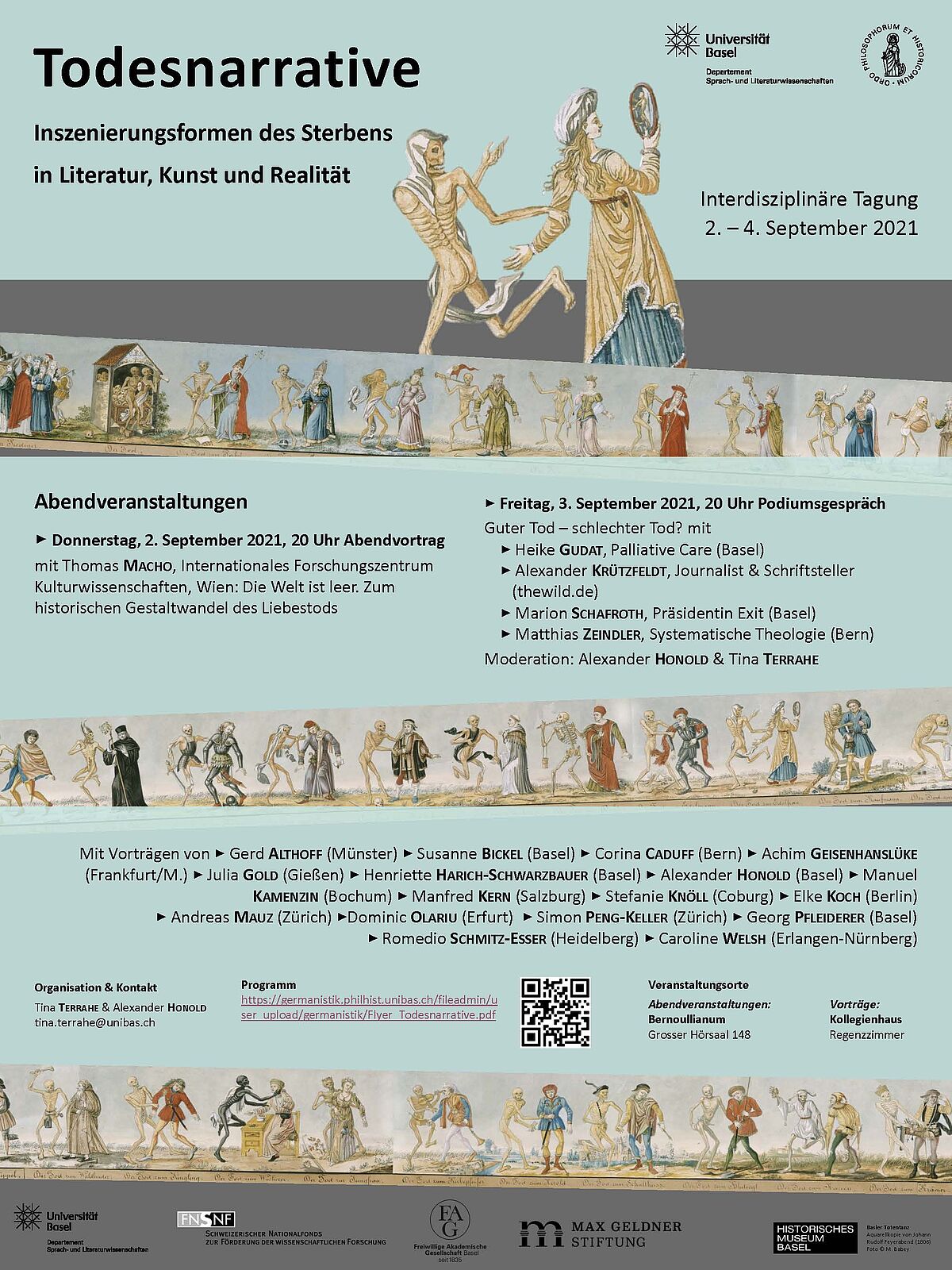
Todesnarrative. Inszenierungsformen des Sterbens in Literatur, Kunst und Realität
Interdisciplinary conference - 2 to 4 September 2021 - University of Basel
Organisation: PD Dr. Tina Terrahe and Prof. Dr. Alexander Honold
Death is an anthropological constant and has shaped the cultural history of mankind since the beginning. Accordingly, the most diverse narrative stagings of death can be found primarily in literary, but also in pictorial representations, artefacts and historical sources, each of which also contains certain interpretations. As the treatment of death and dying says a lot about basic social, cultural and aesthetic constellations, the entire complex touches on essential core areas of human life that are often considered taboo today. In contrast to the modern exclusion of death, dying in historical representations takes place in the centre of society, although this has not yet been examined in detail by researchers.
The conference will therefore focus on representations and forms of presentation of dying from the pre-modern to the modern era and will attempt a historical cross-section of the question of what constitutes a good or bad death. The genuinely literary perspective will be supplemented by contributions from history and related disciplines as well as modern euthanasia.
Programme (pdf) [de]
Poster (pdf) [de]
Organisation des Jubiläums zum 500. Todestag Sebastian Brant († 10. Mai 1521) an der Universität Basel
2021 marks the 500th anniversary of the death of Sebastian Brant, the prominent humanist who worked as a professor of jurisprudence at the University of Basel and as chancellor of the city of Strasbourg. He not only made a name for himself as a highly productive author of Latin poetry, but also published Latin classics and writings by Italian humanists at the beginning of book printing in Basel. As the first bestseller alongside the Bible, his morally satirical ‘Narrenschiff’ was only superseded by Goethe's ‘Werther’.
As a figure of European integration, Sebastian Brant attracted a great deal of public interest. In 1994, the Basel Carnival was organised according to the motto of his ‘Narrenschiff’. Researchers continue to focus intensively on this outstanding personality: current projects are funded by the German Research Foundation (DFG) and the Swiss National Science Foundation (SNF).
Events and projects to mark the anniversary [de]
Memberships / International Co-operations
- Deutscher Germanistenverband [de]
- German Association of University Professors and Lecturers
- Greifswald Medical Humanities Network
- Hessian Medievalists
- Internationale Artusgesellschaft [de]
- International Courtly Literature Society - German Branch [de]
- International Medieval Studies Colloquium
- Mediaevistik – Das deutschsprachige Mittelalter [de]
- Medievalists’ Society
- Mittelaltergermanistik Nord-Verbund [de]
- Oswald von Wolkenstein-Gesellschaft [de]
- SAGG Schweizerische Akademische Gesellschaft für Germanistik [de]
- Wolfram von Eschenbach-Gesellschaft [de]
(6) Ed. with Alexander Honold: Todesnarrative. Inszenierungsformen des Sterbens in Literatur, Kunst und Realität. Basel: Schwabe (series ‘Medical Humanities’) (in preparation).
(5) Ed. with Hermann Schefers: Unheil bannen - Ordnung stiften: Frühmittelalterliche Segen, Beschwörungen und Zaubersprüche zwischen Religiosität, Magie und Medizin. Contributions to the scientific colloquium 31 August - 2 September 2022 at Lorsch Abbey. Heidelberg [2024] (published open access by HeiUP in the series ‘Das Mittelalter. Perspektiven mediävistischer Forschung: Beihefte).
(4) Ed. with Lysander Büchli and Alyssa Steiner: Sebastian Brant, das <Narrenschiff> und der frühe Buchdruck in Basel.Zum 500. Todestag eines humanistischen Gelehrten. Basel 2023.
Reviews:
Wolfgang Schmitz, in: IFB (Information Resources for Libraries)
(3) Berufsrisiko Tod. Narrative Konzepte des (Über- und) Ablebens in der höfischen Epik um 1200. Marburg/Lahn 2019 (429 p., published by deGruyter in the series ‘Quellen und Forschungen zur Literatur- und Kulturgeschichte’).
(2) Edited with Regina Toepfer and Jürgen Wolf: Christa Bertelsmeier-Kierst: Buchkultur und Überlieferung im kulturellen Kontext (Philologische Studien und Quellen 262), Berlin 2017.
Reviews:
Albrecht Classen, in: Mediaevistik 31 (2018/1), pp. 239f.
Eva Rothenberger, in: Tanz in der Vormoderne.Edited by Philip Knäble, Gregor Rohmann and Julia Zimmermann. (Das Mittelalter: Perspektiven mediävistischer Forschung 23 H. 2) Berlin/Boston 2018, p. 469f.
Nigel F. Palmer, in: Medium Aevum 87.1 (2018), p. 215.
(1) Heinrich Steinhöwel's ‘Apollonius’.Edition und Studien (Frühe Neuzeit 179), Berlin 2013 (300 pp.).
Reviews:
Nigel F. Palmer, in: Medium Aevum 84.1 (2015), p. 177.
Albrecht Classen, in: Mediävistik 27 (2014), p. 463.
Nikolaus Henkel, in: Beiträge zur Geschichte der deutschen Sprache und Literatur (PBB) 136 (2014), pp. 727-731;
see also the rebuttal in my essay (9) ‘Poetologische Transformationen bei Heinrich Steinhöwel’ (2017), p. 454, note 45.
- (25) ‘Valentin und Namelos’ II:Intersektionale Narrative in der mittelniederdeutschen Sammelhandschrift Stockholm, Königliche Bibliothek, Cod. Holm. VU 73, in: Übersetzung und Marginalisierung. Frühneuzeitliche Literatur aus intersektionaler Perspektive, ed. by Jennifer Hagedorn and Regina Toepfer (Series: ‘Übersetzungskulturen der Frühen Neuzeit’) Berlin/Heidelberg [2024] (in preparation).
- (24) Pferdesegen und Wurmexorzismus oder: Kontingenzbewältigung im Frühmittelalter. Von der heidnisch-germanischen Zauberformel zum christlich-apotropäischen Mikronarrativ, in: Temporal Communities in der vormodernen Kleinepik. Edited by Maren Jäger, Hans J. Scheuer and Silvan Wagner. (Beiträge zur mediävistischen Erzählforschung, Sonderhefte: Brevitas II) Oldenburg [2024] (with the editors, 21 p.).
- (23) Narrative und überlieferungsgeschichtliche Spezifika eines mittelniederdeutschen Versromans im europäischen Literaturtransfer, in: Literatur im mittelniederdeutschen Sprachraum (1200–1600). Rostocker Kolloquium 2021. ed. by Franz Holznagel (Wolfram-Studien XXVII) Berlin [2024] (in print, 32 p.).
- (22)Hate Speech – Hassrede – 'Hexenhammer'. Literarische Strategien der Inquisition am Beginn der Hexenverfolgung, in: Hassrede und Invektivität in Texten des Mittelalters. Edited by Katharina-Silke Philipowski and Julia Rüthemann (Mitteilungen des Deutschen Germanistenverbandes 71, Heft 3) Göttingen 2024, pp. 283-304.
- (21) Althochdeutsche Zaubersprüche, Beschwörungen und Segen: Kodikologisches und poetisches Framing als Faktor kultureller Konvergenz, in: Framing – Deframing – Reframing. Wege, Mechanismen und Strategien der kulturellen Aneignung in Mittelalter und Früher Neuzeit. Edited by Christina Antenhofer and Heike Schlie. (Interdisziplinäre Beiträge zu Mittelalter und Früher Neuzeit 13) Heidelberg 2024, pp. 65-81.
- (20) Der Tabubruch als Sicherheitslücke: Domestizierung und mythischer Ursprung in der 'Melusine' des Thüring von Ringoltingen, in: Haus - Geschlecht - Sicherheit. Diskursive Formierungen in der frühen Neuzeit [de]. Edited by Sigrid Ruby and Inken Schmidt-Voges (Politiken der Sicherheit / Politics of Security 12). Baden-Baden 2023, pp. 101-116.
- (19) Wenn Frauen sterben, oder: Todesursache Tod. Trauer, Zorn und Liebestod in der Epik des Hochmittelalters, in: Death Matters – Dead Matter. Materialität und Immaterialität des Todes im Mittelalter. Edited by Romedio Schmitz-Esser and Katharina Zeppezauer-Wachauer (Beihefte zur Mediävistik 28). Berlin 2023, pp. 173-191.
- (18) Zus. mit Lysander Büchli, Alyssa Steiner: Sebastian Brant, das <Narrenschiff> und der frühe Buchdruck in Basel. Einleitung, in: Sebastian Brant, das <Narrenschiff> und der frühe Buchdruck in Basel. Zum 500. Todestag eines humanistischen Gelehrten. Edited by Lysander Büchli, Alyssa Steiner and Tina Terrahe, Basel 2023, pp. 15-25.
- (17) Vom lateinischen Glossar zum althochdeutschen Zauberbuch? Der Trierer Codex Hs 40/1018 und seine Transformation im Gebrauchszusammenhang zwischen Religiosität, Medizin und Magie, in: Mittelalterliche Handschriften und ihre Biographien. Betrachtungen aus kunsthistorischer und germanistischer Perspektive. Edited by Margit Dahm-Kruse and Julia von Ditfurth. Kiel 2022, pp. 116-144.
- (16) Vorurteil und Befangenheit in den Gawan-Büchern des Parzival Wolframs von Eschenbach: Liddamus und Kingrimursel, Antikonie und Gawan zwischen Verleumdung und Loyalitätskonflikt, in: Vorurteil und Befangenheit. Kulturelle und literarhistorische Perspektiven. Edited by Amelie Bendheim, Heinz Sieburg and Uta Störmer-Caysa. (Beiträge zur Philosophie N.F.) Heidelberg 2022, pp. 151-187.
- (15) Zus. mit Daniela Wagner: Souveränes Schweigen, zorniger Schall. Zum klanglichen Potenzial der Rolandserzählung in Text und Bild, in: Akustische Dimensionen des Mittelalters. Methoden, Begriffe, Perspektiven. Edited by Gesine Mierke and Martin Clauss. (Das Mittelalter: Perspektiven mediävistischer Forschung 27, H. 1) Heidelberg 2022, pp. 12-50. doi.org/10.17885/heiup.mial.2022.1.24540
- (14) Von Penisraub und Fehlgeburt: Unfruchtbarkeit und Impotenz-Zauber im ‚Malleus maleficarum‘ des Heinrich Kramer (Institoris) und in Johannes Hartliebs ‚Secreta mulierum‘, in: Kinderlosigkeit im Mittelalter. Edited by Regina Toepfer and Bettina Wahrig. (Das Mittelalter: Perspektiven mediävistischer Forschung 26, H. 2) Heidelberg 2021, pp. 461-481. doi.org/10.17885/heiup.mial.2021.2.24452
- (13) Beschwörung, Bann und Bienen-Segen, in: Mapentiure Hessen. Auf den Spuren mittelalterlicher Literatur. Edited by Nathanael Busch, Anna Hofmann and Julia Josten. Darmstadt 2021, pp. 160-163.
- (12) Streiter, Denker, Diplomat: Gawan und die Dekonstruktion des âventiure-Ritters im 'Parzival' Wolframs von Eschenbach, in: Poesie des Widerstreits. Etablierung und Polemik in den Literaturen des Mittelalters. Edited by Anna K. Bleuler and Manfred Kern. (Interdisziplinäre Beiträge zu Mittelalter und Früher Neuzeit 10) Heidelberg 2020, pp. 319-342.
- (11) Mich enwold es niht erlâzen des künec Etzelen wîp. Alternative Fakten zu Rüdigers Treuekonflikt in 'Nibelungenlied' und 'Klage', in: Die Nibelungenklage; Rüdeger von Bechelaren. 13. und 14. Pöchlarner Heldenliedgespräch. Edited by Johannes Keller, Florian Kragl and Stephan Müller. (Philologica Germanica 39) Vienna 2019, pp. 347-364.
- (10) Feenroman oder Kreuzzugspropaganda? Die 'Melusine' des Thüring von Ringoltingen im soziokulturellen und zeithistorischen Kontext, in: Der Kurzroman in den spätmittelalterlichen Sammelhandschriften Europas / Pan-European Romances in Medieval Compilation Manuscripts. Edited by Miriam Edlich-Muth. (Imagines Medii Aevi. Interdisziplinäre Beiträge zur Mittelalterforschung 40) Wiesbaden 2018, pp. 155-166.
- (9) Poetologische Transformationen bei Heinrich Steinhöwel, in: Humanistische Antikenübersetzung und frühneuzeitliche Poetik in Deutschland (1450–1620). Edited by Regina Toepfer, Johannes Klaus Kipf and Jörg Robert. (Frühe Neuzeit 211) Berlin/Boston 2017, pp. 439-460. doi.org/10.1515/9783110527230-022
- (8) Stimme und Sprechen bei Hartmann von Aue: Textinterne Performanz-Signale und deren Reflexe in der Gießener 'Iwein'-Handschrift, in: Stimme und Performanz in der mittelalterlichen Literatur. Edited by Monika Unzeitig, Nine Miedema and Angela Schrott. (Historische Dialogforschung 3) Berlin 2017, pp. 33-53. doi.org/10.1515/9783110496031-003
- (7) Zwischen utopischer Idealität und politischer Pragmatik: Ritterlehre und Herrschertugenden in der Sangspruchdichtung des 13.–15. Jahrhunderts, in: Sangspruchdichtung zwischen Reinmar von Zweter, Oswald von Wolkenstein und Michel Beheim. Contributions to the international conference from 30 September to 3 October in Brixen. Edited by Horst Brunner and Freimut Löser. (Jahrbuch der Oswald von Wolkenstein-Gesellschaft 21) Wiesbaden 2017, pp. 73-87.
- (6) Veritas fabulosa et fictio historica bei Heinrich Steinhöwels ‘Apollonius’ und Johannes Hartliebs ‘Alexander’: Zur politisch-ideologischen Funktionalisierung zweier ‘Romane’ im Kontext der Kreuzzugsideologie des 15. Jahrhunderts, in: Die Bedeutung der Rezeptionsliteratur für Bildung und Kultur der Frühen Neuzeit (1400-1750) III. Contributions to the second workshop in Wissembourg/Weißenburg (March 2014). Edited by Peter H. Andersen and Barbara Lafond-Kettlitz. (Jahrbuch für Internationale Germanistik, Reihe A, Kongressberichte 120) Bern et al. 2015, pp. 275-310. doi.org/10.3726/978-3-0351-0812-5
- (5) Das dünne Eis der eigenen Meinung. Plagiatsfälle in studentischen Qualifikationsarbeiten: Erscheinungsformen, Aufdeckung und Konsequenzen für die Lehre, in: Das Plagiat. Edited by Heinrich Kaulen and Mark-Georg Dehrmann. (Mitteilungen des deutschen Germanistenverbandes 2015, Heft 2) Göttingen 2015, pp. 180-191. doi.org/10.14220/mdge.2015.62.2.180
- (4) Nu lerne, waz sterben si! Zum höfischen Umgang mit drô und spot am Beispiel der kampfeinleitenden Reizreden bei Hartmann und Wolfram, in: Ironie, Polemik und Provokation im Artusroman. Edited by Cora Dietl, Christoph Schanze and Friedrich Wolfzettel. (Papers of the International Arthurian Society: Section Germany, Austria 10) Berlin/Boston 2014, pp. 133-161. https://doi.org/10.1515/9783110343915.133
- (3) Neue Befunde zu Heinrich Steinhöwel und zur Datierung seines 'Apollonius', in: Zeitschrift für deutsches Altertum und deutsche Literatur142, H. 2 (2013), pp. 217-227.
- (2) Frankfurts Aufstieg zur Druckmetropole des 16. Jahrhunderts. Christian Egenolff, Sigmund Feyerabend und die Frankfurter Buchmesse, in: Frankfurt im Schnittpunkt der Diskurse: Strategien und Institutionen literarischer Kommunikation im späten Mittelalter und in der frühen Neuzeit. Edited by Robert Seidel and Regina Toepfer. (Zeitsprünge. Forschungen zur Frühen Neuzeit 14) Frankfurt/Main 2010, pp. 177-194.
- (1) Eine neue Handschrift der ‘Melusine’ Thürings von Ringoltingen, in: Zeitschrift für deutsches Altertum und deutsche Literatur 138, H. 1 (2009), pp. 50-52.
Online
- Article ‘Heldentod’, in: Compendium Heriocum. Online lexicon of the Sonderforschungsbereichs 948 „Helden – Heroisierungen – Heroismen“ at the University of Freiburg [2021] (in preparation).
- (1-13) Description of all witnesses to the transmission of Heinrich Steinhöwel's ‘Apollonius’ in the DFG project MFRH (‘Marburger Repertorium für Übersetzungsliteratur im deutschen Frühhumanismus’): MRFH 10490, 11150, 10480, 11010, 11110, 10750, 20180, 20190, 20200, 20210, 20220, 20230, 20240.
- (R8) Magie und Literatur. Erzählkulturelle Funktionalisierung magischer Praktiken in Mittelalter und Früher Neuzeit. Edited by Andreas Hammer, Wilhelm Heizmann, Norbert Kössinger, Berlin 2022, in: Zeitschrift für deutsches Altertum und deutsche Literatur [2024] (in preparation).
- (R7) Der Begriff der Magie in Mittelalter und Früher Neuzeit. Edited by Jutta Eming and Volkhard Wels. (Epistene in Bewegung 17) Wiesbaden 2020, in: Zeitschrift für deutsches Altertum und deutsche Literatur [2024] (in preparation).
- (R6) Bernhard Schnell, Arzneibücher - Kräuterbücher - Wörterbücher. Kleine Schriften zur Text- und Überlieferungsgeschichte mittelalterlicher Gebrauchsliteratur, ed. by Dorothea Klein ('Publications from the “Mittelalter und Frühe Neuzeit” Centre 7), Würzburg 2019, in: Zeitschrift für deutsches Altertum und deutsche Literatur 151, H. 2 (2022), pp. 268-272.
- (R5) Ludger Lieb: Hartmann von Aue. Erec - Iwein - Gregorius - Poor Henry (Klassiker-Lektüren 15). Berlin 2020, in: Das Mittelalter. Perspektiven mediävistischer Forschung. Edited by Regina Toepfer on behalf of the Presidium of the Mediävistenverband 26, H. 2 (2021), pp. 527-528. doi.org/10.17885/heiup.mial.2021.2.24465
- (R4) Essi M. Djinkpor: Diplomatische Kompetenzen und Geschlecht. Konfliktlösung und Friedensstiftung im höfischen Roman. Kassel 2018, in: Germanistik 61, H. 1-2 (2020), p. 214.
- (R3) Verklungene Klänge innovativ erforscht. Martin Clauss, Gesine Mierke und Antonia Krüger machen mit „Lautsphären des Mittelalters“ historische Akustik wieder hörbar. Review of: Lautsphären des Mittelalters. Akustische Perspektiven zwischen Lärm und Stille. Edited by Martin Clauss, Gesine Mierke and Antonia Krüger. (Supplements to the Archiv für Kulturgeschichte 89) Cologne 2019, in: literaturkritik.de [de] (14 April 2020).
- (R2) Katharina Hanuschkin: Intrigen - Die Macht der Möglichkeiten in der mittelhochdeutschen Epik. (Trierer Beiträge zu den historischen Kulturwissenschaften 16) Wiesbaden 2015, in: Germanistik 57, H. 3-4 (2016), p. 598f. doi.org/10.1515/germ-2017-3-428
- (R1) Dorothee Ader: Prosaversionen höfischer Epen in Text und Bild. Zur Rezeption des ‘Tristrant’ im 15. und 16. Jahrhundert. (Beiträge zur älteren Literaturgeschichte) Heidelberg 2010, in: Zeitschrift für deutsches Altertum und deutsche Literatur 141, H. 4 (2012), pp. 494-500.
Podcast / Radio
- Podcast episode (interview): ‘Werwolf, Hexe, Püsterolsch - Aberglauben in Mecklenburg und Pommern [de]’ (from min. 24'14) on the scientific DFG network ‘’Wort - Wirkung - Wunder‘ A production by Heiko Kreft from the series ‘Der Kunstkaten - Kultur aus MV [de]' A horse's head under the pillow - what's that all about? Superstition was widespread in Mecklenburg and Western Pomerania in earlier centuries. From witches to werewolves - Heiko Kreft tells the regional cultural history of superstition. Broadcast date 01 November 2024.
- (47) “Wundsegen und Kräuterzauber: Mittelalterliche Formeln von Heil und Heilung.” Lecture series to mark the 755-year town celebrations on Medieval Greifswald. 22 October 2025 in the Vereinshaus des Nachbarschaftshilfevereins WGG e. V., Makarenkostr. 18 in 17489 Greifswald.
- (46) ‘Namenmagie in deutschsprachigen Texten des Mittelalters: Potenzial, Geheimnis und Aura.’ Lecture at the symposium of the Mediävistenverband "In nomine - Name und Benennung im Mittelalter" 23-26 February 2025, University of Salzburg, organisation: Manfred Kern, Christina Antenhofer and Alexander Zerfaß.
- (45) ‘Spell, Incantation or Prayer? Old High German Intercessory Minuscule-Marginalia from a Praxeological Perspective’. Workshop Between Liturgy and Magic: Minuscule Texts and Intercessory Practices in the Early Middle Ages. 29-30 October 2024 at the University of Oslo, Organisation: Prof. Ildar Garipzanov and Dr. Claire Burridge
- (44) ‘Name und Zauberwort: Zur semiotischen Signifikanz von Sprache in der Vormoderne’ Inaugural lecture, 16 July 2024 in the Aula of the University of Greifswald, Domstraße 11, Entrance 2.
- (43) ‘Sternenglanz und kosmisches Geheimnis: Astrologie im Mittelalter’ from the lecture series ‘Universität im Rathaus’, 15 July 2024 in Greifswald Town Hall.
- (42) ‘Working Wonders with Words: Old High German magic spells, blessings and incantations between medicine, religion and magic.’Lecture at the ‘International Medieval Congress’, 1-4 July 2024, University of Leeds.
- (41) ‘Versprechen, verzaubern, verbannen: Transzendente Dimensionen von Sprachgewalt in der Literatur des Mittelalters.’ Lecture at the conference ‘Sinnlich-übersinnliche Dinge. Verführungen des Virtuellen", 19-21 June 2024, International Research Centre for Cultural Studies (IfK) at the University of Art and Design Linz in Vienna, organised by Jakob Moser, Angelika Seppi and Karin Harrasser.
- (40) ‘Working Wonders with Words: Old High German magic spells, blessings and incantations between medicine, religion and magic.’ Lecture at the conference: ‘The Performing Magic in the pre-Modern North’, 21-22 February 2024, University of Aberdeen.
- (39) ‘Wundsegen und Kräuterzauber: Mittelalterliche Formeln von Heil und Heilung’, lecture as part of the lecture series ‘Kultur im Kloster’ at the Kulturhistorisches Museum Rostock, 16 October 2023, organised by the Arbeitskreis mediävistischer NachwuchswissenschaftlerInnen Rostock in cooperation with the Kulturhistorisches Museum Rostock.
- (38) ‘Glantz der Sternen und die Schönheit des Kosmos: Ästhetische Strategien der Wissensvermittlung in astrologischen Texten des Mittelalters’, lecture at the conference ‘Dichten über den Himmel. Astronomische Bilder, mythische Gleichungen, Religiöses’, 5-7 October 2023 at the Institute for German Language, Literature and Interculturality of the Université du Luxembourg, Campus Belval, Organisation: Amelie Bendheim.
- (37) ‘Sprache und Macht: Zur heiligen und magischen Semiotik mittelalterlicher Zaubersprüche, Segen und Beschwörungen’, lecture at the conference ‘Hidden, Sacred and Magical Semiotic Landscapes: Interdisciplinary Perspectives’, 19-21 July 2023 at the UNESCO World Heritage Site Lorsch Abbey, organised by Hirut Woldemariam, Anne Storch and Hermann Schefers.
- (36) ‘ Der Tod und die Ehre oder: Warum es manchmal besser ist, Besiegte doch nicht zu töten. Lecture in the section ‘Tod und Ehre - Gnade und Frieden’ (organised by Tina Terrahe) at the 19th Symposium of the Mediävistenverband in Würzburg 5-8 March 2023 on the topic of ‘ Normen und Ideale’, organised by the Romanistisches Institut, University of Würzburg.
- (35) ‘Gebet, Segen oder psychopathologischer Heilzauber? Frühmittelalterliche Formeln zwischen Theologie und Literatur, Medizin und Magie’, lecture in the lecture series of the “Mittelaltergermanistik Nord-Verbund” on 13 December 2022 at the University of Greifswald, organisation: Christian Schneider.
- (34) ‘Mittelalterliche (Zauber-)Sprüche, Segen und Beschwörungen im kodikologischen und praxeologischen Kontext: Vorüberlegungen zu einem digitalen Repertorium.’ Lecture at the conference ‘Unheil bannen - Ordnung stiften. Frühmittelalterliche Segen, Beschwörungen und Zaubersprüche zwischen Religiosität, Magie und Medizin’. Scientific colloquium: 31 August - 2 September 2022 at the UNESCO World Heritage Site Lorsch Abbey. Organisation: Hermann Schefers and Tina Terrahe.
- (33) ‘Töten, sterben und überleben im Eneasroman Heinrichs von Veldeke’, lecture as part of the master's seminar ‘Todt, euch sei verfluchet!’Tod und Sterben in der mittelalterlichen Literatur’, University of Luxembourg (LUX), 24 May 2022, 13.15-14.45, organisation: Amelie Bendheim.
- (32) ‘Valentin und Namelos II: Intersektionale Narrative in der mittelniederdeutschen Sammelhandschrift Stockholm, Königliche Bibliothek, Cod. Holm. VU 73', lecture as part of the interdisciplinary workshop ’Übersetzung und Marginalisierung. Frühneuzeitliche Literatur aus intersektionaler Perspektive’, University of Würzburg, 21-23 February 2022, Organisation: Jennifer Hagedorn and Regina Toepfer.
- (31) ‘Von Hühnern, Würmern und lahmen Pferden: Kodikologische und praxeologische Befunde zu den ältesten deutschen ‘Zaubersprüche’', lecture at the medieval research colloquium / Colloque de recherche interuniversitaire romand en littérature allemande médiévale, Université de Fribourg (CH), 19 November 2021; organised by Cornelia Herberichs and René Wetzel.
- (30) ‘Valentin und Namelos - narrative und überlieferungsgeschichtliche Spezifika eines mittelniederdeutschen Versromans im europäischen Literaturtransfer’, lecture at the conference of the Wolfram von Eschenbach-Gesellschaft ‘Literatur im mittelniederdeutschen Sprachraum (1200-1600)’, University of Rostock, 15-19 September 2021, organisation: Franz Holznagel.
- (29) ‘Althochdeutsche Zaubersprüche, Beschwörungen und Segen: Kodikologisches und poetisches Framing als Faktor kultureller Konvergenz’, lecture at the conference ‘Framing-Deframing-Reframing. Wege, Mechanismen und Strategien der kulturellen Aneignung in Mittelalter und Früher Neuzeit’, Krems a.d. Donau (A), 15-17 September 2021, organised by Christina Antenhofer and Heike Schlie.
- (28) ‘Einleitung und thematische Hinführung, oder: Todesnarrative in der Epik des Hochmittelalters’, lecture at the interdisciplinary conference ‘Todesnarrative. Inszenierungsformen des Sterbens in Literatur, Kunst und Realität’, 2-4 September 2021, University of Basel (CH), organised by Alexander Honold and Tina Terrahe.
- (27) ‘ Pferdesegen und Wurmexorzismen: Heil- und wundersame Kleinstepik mit großer Wirkung’, lecture at the workshop “Temporal Communities in der vormodernen Kleinepik”, 18-19 March 2021, Humboldt-Universität zu Berlin, organisation: Maren Jäger, Hans Jürgen Scheuer, Silvan Wagner.
- (26) ‘Sebastian Brant (1457-1521): Einführung zu Leben und Werk’, lecture as part of the digital lecture series “Sebastian Brant und der frühe Buchdruck in Basel: Zum 500. Todestag eines humanistischen Gelehrten”, 3 March 2021, University of Basel (CH), organised by Tina Terrahe.
- (25) ‘Projektvorstellung: Zaubern, Heilen, Dichten’, lecture at the online conference of the international network ‘Historische Wissens- und Gebrauchsliteratur’ (HWGL), 8-11 January 2021, organised by Marco Heiles and Simone Schultz-Balluff.
- (24) ‘Der Tabubruch als Sicherheitslücke.Domestizierung und mythischer Ursprung in der Melusine des Thüring von Ringoltingen’ Lecture at the conference ’Haus-Geschlecht-Sicherheit. Diskursive Formierungen in der Frühen Neuzeit’ of the CRC 138 Dynamics of Security, University of Marburg, Herder Institute, 7-8 December 2020, Organisation: Inken Schmidt-Voges and Sigrid Ruby.
- (23) ‘Dämonische Wassergeister und zauberkundige Frauen in Mittelalter und Früher Neuzeit: Die Dame vom See im Lancelot und Melusine’ (digital), guest lecture as part of the interdisciplinary lecture series ‘Hexen, Teufel und Dämone’ at the Philipps-Universität Marburg, 15 June 2020, organised by Hania Siebenpfeiffer. Now online on youtube.
- (22) ‘Zwischen Verleumdung und Loyalitätskonflikt: Vorurteil und Befangenheit in den Gawan-Büchern des Parzival Wolframs von Eschenbach’, lecture as part of the colloquium ‘Vorurteil und Befangenheit’, University of Mainz, 13-15 February 2020, organisation: Uta Störmer-Caysa.
- (21) ‘Tödlicher Klang und machtvolles Schweigen im Rolandslied des Pfaffen Konrad’, lecture at the conference ‘Klang der Macht - Macht des Klangs in Gesellschaften und Medien der Vormoderne’, Friedrich Schiller-Universität Jena, 22-23 November 2019, organised by Sophie Marshall and Jan Stellmann.
- (20) ‘Literatur und Medizin in Mittelalter und Früher Neuzeit’, lecture at the XLVII. International Medieval Colloquium, University of Olomouc (CZ), 24-31 August 2019, Organisation: Kristýna Solomon.
- (19) ‘’Zaubern, Heilen, Dichten: Zum Verhältnis von Literatur und Medizin in Mittelalter und Früher Neuzeit', public habilitation colloquium as part of the meeting of the Faculty Council 09 German and Art Studies at Philipps-Universität Marburg, 3 July 2019, Chair: Malte Hagener.
- (18) ‘Berufsrisiko Tod: Überleben im Aventiure-System der Artusromane Hartmanns von Aue’, lecture at the XLVI International Medieval Colloquium, Bad Bevensen, 10-14 September 2018, organised by Regina Toepfer.
- (17) ‘Heilige Helden: Töten, Sterben und Überleben im Rolandslied des Pfaffen Konrad’ Guest lecture as part of the lecture ’Poesie am Ende. Todesdarstellung in der europäischen Literatur des Mittelalters’, Paris Lodron University Salzburg (A), 25 April 2018, organised by Manfred Kern.
- (16) ‘Berufsrisiko Tod: Narrative Konzepte des (Über- und) Ablebens in der höfischen Epik um 1200’, guest lecture as part of the advanced seminar ‘Werkstattberichte aus laufenden Forschungsarbeiten in der Mediävistik’, Justus Liebig-Universität Gießen, 14 November 2017, organised by Cora Dietl, Christine Reinle and Stefan Tebruck.
- (15) ‘Berufsrisiko Tod: Narrative Konzepte des (Über- und) Ablebens in der höfischen Epik um 1200’, guest lecture as part of the seminar ‘Sterben und Tod im Mittelalter. Die Kunst des Sterbens: Umgang mit dem Tod im Mittelalter’, Christian Albrechts-Universität Kiel, 2 November 2017, organised by Andreas Bihrer and Julia Weitbrecht.
- (14) ‘Architektur als literarische Beglaubigungsstrategie: Die Melusine des Thüring von Ringoltingen im Kontext der Kreuzzugspropaganda des 15. Jahrhunderts’, lecture at the conference ‘Aktuelle Forschungen zu Burg und Adel im interdisziplinären Dialog’, University of Tübingen, 26-28 October 2017, Organisation: Promotionsverbund Burg und Adel.
- (13) ‘Berufsrisiko Tod: Narrative Konzepte des (Über- und) Ablebens in der höfischen Epik um 1200’, lecture at the XLV. International Medieval Colloquium, Strobl/Wolfgangsee (A), 9-16 September 2017, Organisation: Manfred Kern.
- (12) ‘Mich enwold es niht erlâzen des künec Etzelen wîp. Alternative Fakten zu Rüdigers Treuekonflikt in Nibelungenlied und Klage', lecture as part of the conference ’Rüdeger von Bechelaren. 14. Pöchlarner Heldenliedgespräch’, symposium of the Institute of German Studies of the University of Vienna and the Nibelungenstadt Pöchlarn (A), 19-22 April 2017, honorary chair: Klaus Zatloukal, academic directors: Johannes Keller and Stephan Müller.
- (11) „Textual transformations at the printing-revision by Heinrich Steinhöwels Apollonius”, lecture as part of the conference ‘The Changing Face of Medieval Dutch Narrative Literature in the Early Period of Print’, Second Expert Meeting University of Antwerp (BE), 9-10 June 2016, organisation: Elisabeth de Bruijn, Rita Schlusemann, Bart Besamusca and Frank Willaert.
- (10) ‘’Streiter - Denker - Diplomat. Zur polemischen Dekonstruktion des âventiure-Ritters im Parzival‘ Wolframs von Eschenbach’, lecture as part of the conference ‘Poesie des Widerstreits. Etablierung und Polemik in den Literaturen des Mittelalters und der frühen Renaissance’, Focus on Science and Art, Paris Lodron University Salzburg (A), 15-17 October 2015, organised by Anna Kathrin Bleuler, Manfred Kern and Peter Kuon.
- (9) ‘Ritterlehre und Herrschertugenden in der Spruchdichtung des 13. bis 15. Jahrhunderts’, lecture as part of the conference ‘Sangspruchdichtung zwischen Reinmar von Zweter, Oswald von Wolkenstein und Michel Beheim’, international conference of the Oswald von Wolkenstein-Gesellschaft, Brixen (I), 30 September - 3 October 2015, organisation: Horst Brunner and Freimut Löser.
- (8) ‘Stimme und Sprechen bei Hartmann von Aue. Text-internal performance signals and their reflexes in the Giessen Iwein manuscript’, lecture at the XLIII. International Medieval Colloquium, University of Vienna/Gumpoldskirchen (A), 5-12 September 2015, Organisation: Matthias Meyer.
- (7) ‘ Feenroman oder Kreuzzugspropaganda? Die Melusine des Thüring von Ringoltingen im soziokulturellen und zeithistorischen Kontext', lecture as part of the conference “Der Kurzroman im mittelalterlichen Europa”, international conference of the Institute for Medieval and Early Modern Studies at the University of Bremen, 31 October - 1 November 2014, organisation: Miriam Edlich-Muth.
- (6) ‘Übersetzer, Dichter und interpres: Poetologische Transformationen bei Heinrich Steinhöwel’, lecture as part of the 4th work meeting of the scientific DFG network ‘Humanistische Antikenübersetzung und frühneuzeitliche Poetik in Deutschland (1450-1620)’, University of Basel (CH), 30-31 October 2014, organised by Regina Toepfer and Johannes Klaus Kipf.
- (5) ‘veritas fabulosa et fictio historica bei Alexander und Apollonius. Zur Rezeption zweier spätantiker ‘Romane’ im Kontext des deutschen Frühhumanismus', lecture as part of the conference “Die deutschsprachige Rezeptionsliteratur der Frühen Neuzeit”, Wissembourg (FR), 13-15 March 2014, organised by Barbara Lafond and Peter Andersen.
- (4) ‘Nu lerne was sterben si! Drô und spot in den kampfeinleitenden Reizreden bei Hartmann und Wolfram', lecture as part of the conference “Ironie, Polemik und Provokation”, colloquium of the German-Austrian section of the International Arthurian Society, Justus Liebig University Giessen/Rauischolzhausen, 24-27 February 2013, organisation: Cora Dietl.
- (3) ‘Zur Edition von Heinrich Steinhöwels Apollonius’, lecture as part of the conference ‘Spätmittelalterliche Überlieferung in der Editionspraxis’, Ruhr-Universität Bochum, 6-8 April 2011, organised by Ute von Bloh and Bernd Bastert.
- (2) ‘Apollonius von Tyrus als europäische Integrationsfigur’, lecture as part of the German Germanists' Day at the Albert-Ludwigs-Universität Freiburg, 19-22 September 2010, Section 2: European Heritage, organised by Ina Karg, Holger Runow and Manfred Eikelmann.
- (1) ‘Frankfurts Aufstieg zur Druckmetropole des 16. Jahrhunderts - Christian Egenolff, Sigmund Feyerabend und die Frankfurter Buchmesse’, lecture as part of the interdisciplinary conference ‘Literarisches Leben in Frankfurt im späten Mittelalter und in der frühen Neuzeit’, Goethe University Frankfurt am Main, 9-10 October 2008, organised by Robert Seidel and Regina Toepfer. Topic: Working Wonders with Words: Old High German magic spells, blessings and incantations between medicine, religion and magic. February 2024, University of Aberdeen.


